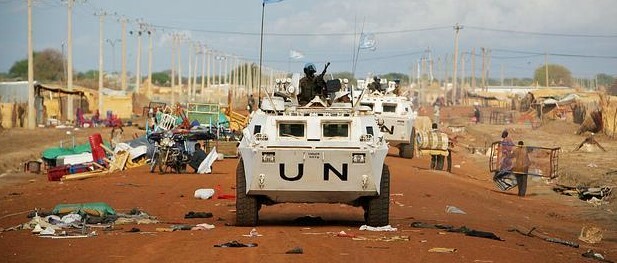The UN Security Council extended the mandate of the UN peacekeeping force in South Sudan for another year Wednesday.
Resolution 2677 (2022) was adopted with 13 votes in favour- 0 against -2 abstentions (China, Russian Federation).
The United Nations Mission in South Sudan’s (UNMISS) mandate will now continue until 15 March 2024.
“UNSC decides that UNMISS’s mandate is designed to advance the three-year strategic vision defined in resolution 2567 (2021) to prevent a return to civil war in South Sudan, to build durable peace at the local and national levels, and to support inclusive and accountable governance and free, fair, and peaceful elections in accordance with the Revitalised Agreement,” the Council’s resolution read. “Decides that UNMISS shall have the following mandate, authorizes UNMISS to use all necessary means to implement its mandate, requests the Secretary-General to inform the Security Council of any obstacles to the implementation of the mandate, and stresses that the protection of civilians shall be given priority in decisions about the use of available capacity and resources.”
The UNSC also decided to maintain the overall force levels of UNMISS with a troop ceiling of 17,000 personnel and a police ceiling of 2,101 personnel, including 88 justice and corrections advisors, and expressed readiness to consider adjustments to UNMISS force levels and capacity-building tasks based on security conditions on the ground and implementation of priority measures.
The 15-member Council also tasked UNMISS to focus on four key areas: the protection of civilians; the creation of conditions conducive to the delivery of humanitarian assistance; supporting the implementation of the Revitalized Agreement and the Peace Process; and monitoring, investigating, and reporting on violations of international humanitarian law, as well as abuses of human rights.
According to the UNSC decision, the UNMISS’s mandate is designed to advance the three-year strategic vision defined in resolution 2567 (2021) to prevent a return to civil war in South Sudan, to build durable peace at the local and national levels, and to support inclusive and accountable governance and free, fair, and peaceful elections in accordance with the Revitalized Agreement.
On the South Sudan Peace Process, the UNSC, among other things, demanded that all parties to the conflict and other armed actors immediately end the fighting throughout South Sudan and engage in political dialogue and expressed deep concern about the delays in implementing the Revitalised Agreement.
The Council also stressed that conducting free and fair elections, reflecting the will of all South Sudanese, is critical for a transition toward a stable, inclusive, democratic, and self-reliant state and called upon the government of South Sudan as well as all relevant parties to ensure an environment conducive to open political dialogue consistent with the Revitalised Agreement, which includes free and constructive political debate, freedom of opinion and expression, including for civil society, opposition parties, and members of the press.
The Council also demanded freedom of peaceful assembly, equitable access to media, including state media, the security of all political actors, freedom of movement for all candidates, as well as for the presence of domestic and international election observers and witnesses, journalists, human rights activists and actors from civil society including women, which can help lead to free and fair elections.
South Sudan’s President Salva Kiir, opposition leader Riek Machar and other political figures signed a peace agreement in 2018 that ended five years of civil war.
Implementation of the peace agreement has been slow, and the opposing parties have frequently disagreed over how to share power.
The term of the current transitional government was initially set to expire in 2022. In August 2022, the parties to the peace agreement extended the transitional government’s time in office for another two years, meaning elections would be held in December 2024.




